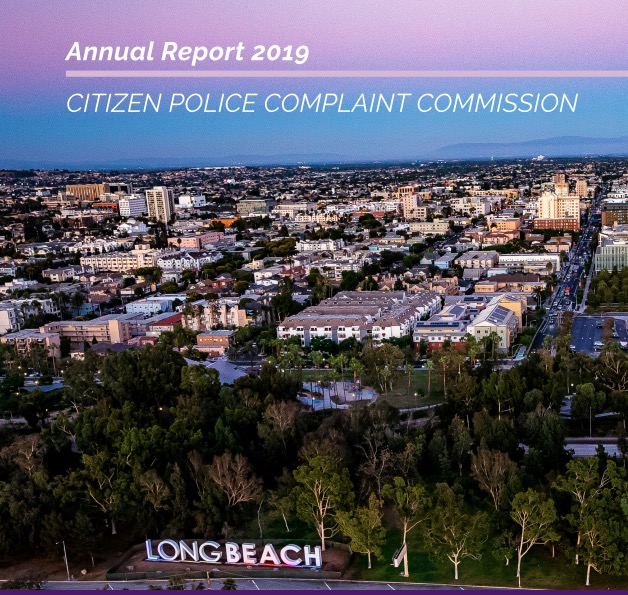Recent Citizen Police Complaint Commission Reform Efforts

Since the murder of George Floyd, there has been a flurry of activity at the Long Beach Citizen Police Complaint Commission in response to calls for reform. In July, the CPCC finally filed five years of missing annual reports—reports the CPCC’s by-laws require to be completed every year. The CPCC held a special meeting to address reform, and the CPCC was a frequent topic of the city’s “Framework on Reconciliation.”
So far, the city has pushed any major reform far into the future—with Mayor Garcia and others stating reform must come through structural change to the City Charter in the next election in 2022. In the meantime, a city council commissioned Racial Equity and Reconciliation Initiative report suggested three short-term changes, in addition to increased CPCC funding.
The suggested short-term changes in the report are:
1. Direct the CPCC to issue quarterly reports
2. Institute commissioner training led by the City Attorney’s office
3. Provide officer compelled statements to the CPCC
Recommendation one would be a significant change, given only annual reports are currently required (and those had been skipped since 2015). A more important change would be to improve the quality of the data in the reports. Currently, the CPCC dismisses most cases without a CPCC hearing by issuing a “No-Further Action” finding. In many years, 80% or more of cases are handled this way. Reasons for closing an allegation with an NFA range from CPCC investigators being unable to locate a witness, a witness being uncooperative, or if a complaint is withdrawn. Sometimes it’s simply a staff recommendation—with there being no way to tell in the data how many were closed for what reason.
Even when the CPCC hears cases, it often does not matter. The City Manager overrules the CPCC about 5% of the time, but 5% is also approximately how often the CPCC sustains allegations of wrongdoing. For all we know, the City Manager overturns every serious finding of guilt—while letting a few complaints about discourteous language stand. The way the reports present the data makes any meaningful analysis impossible.
The reason for this obfuscation does not hold water. In reporting by the Signal Tribune, the City Manager was paraphrased as saying, “he wished there was a way to see the outcomes of particular cases, but acknowledged that it would mean that people may be able to correlate complaint outcomes with specific officers.” CheckLBPD does not see what would be wrong with that. You can already request officer disciplinary files under Senate Bill 1421 that contain the officer’s name and documents from the department’s internal reviews and shooting review boards.
Recommendation two (Institute commissioner training led by the City Attorney’s office) would be a major improvement. CPCC training is currently conducted by the LBPD—which is about as backward as you can get.
Recommendation three (Provide officer compelled statements to the CPCC) would also be a significant improvement. Long Beach already protects officers from having to give a compelled statement after an incident; keeping the voluntary, uncross-examined officer statements from the CPCC turns a flawed system into an absurd one.
The city has already acted on the calls for increased CPCC funding. The first year of increased funding is being used to commission a $150,000 study to evaluate possible CPCC reforms and innovations.
The city’s history with independent reports and studies does not inspire confidence that this report will be of any benefit to reform efforts. Past reports related to LBPD reform have either told the city what they wanted to hear or been suppressed—as shown by our TigerText preliminary investigation and the International Associations of Chiefs of Police study.
In 2017, the LBPD hired the International Association of Chiefs of Police to provide a systematic evaluation of the management and operation of the LBPD. In 2019, the city canceled that contract before the report could be issued and then withheld the final half of the $96,000 payment. The city fought in court to keep the 122-page report from seeing the light of day. As usual, it was the tenacious reporting of Stephen Downing that allowed this public document to be seen by the public.
CheckLBPD considers the biggest problems with the CPCC to be 1) it does not use the investigative powers it was originally granted (having never called a witness under oath or issued a subpoena for documents), and 2) its decisions have no real power due to the City Manager’s veto power. The real power in misconduct investigation lies with the Chief of Police and the City Manager—the CPCC being little more than window dressing, or in the words of a CPCC commissioner “a farce.”
In the near future, CheckLBPD will review all the CPCC annual reports to look for trends and additional areas of reform suggested by the data (or lack of data). When the city’s $150,000 report is released, CheckLBPD will be ready to take a deep-dive into it.
In the meantime, CheckLBPD has republished this article by our founder Greg Buhl, that examines the CPCC’s first marathon meeting after the George Floyd murder in the context of the CPCC’s history and structure.
Questions, comments, or tips can be directed to Greg@CheckLBPD.org (encrypted on our end with protonmail)



